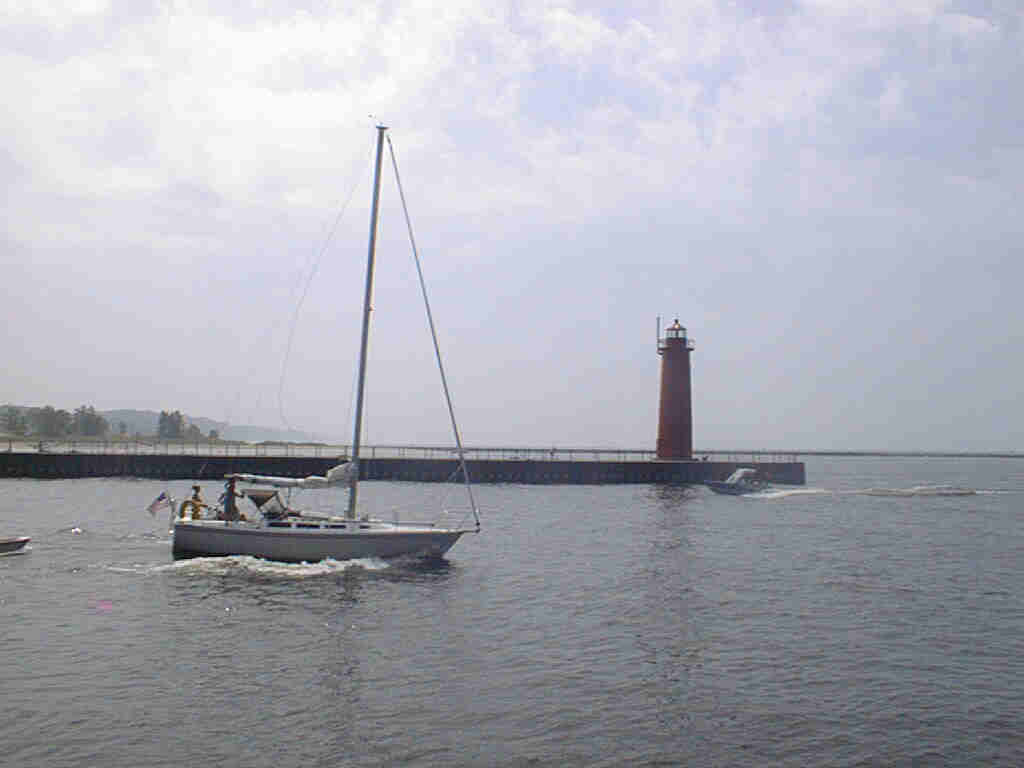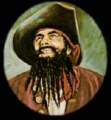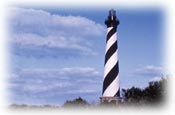
(Matthew 16:13-23)
May these words of this Peter be like a rock,
not a stumbling block!
|
|
"Who do you say
that I am?" Jesus asked. Simon Peter answered, "You
are the Messiah, the Son of the living God." And Jesus
answered, "Blessed are you, Simon son of Jonah! ... You are
Peter (petros), and on this rock (petra)
I will build my church..." Jesus then began to speak of
the rough road ahead. And Peter took him aside and rebuked him... "Get
behind me, Satan!" Jesus replied. "You are a stumbling
block..." (Matthew 16:13-23) May these words of this Peter be like a rock, |
"As to a lamp shining in a dark place"
Message preached February
10 , 2002
Long Green Valley Church of the Brethren
Glen Arm, Maryland USA
based upon 2
Peter 1:16-21
Down
through the years there have been over a thousand documented shipwrecks along
the outer banks of North Carolina, an area sometimes called "the
graveyard of the Atlantic." The shallow waters, and the changing
shoals, made it a  navigational
nightmare for mariners of old, especially in the dark of night or in the middle
of a storm. Over time, lighthouses were constructed along this treacherous
stretch of surf and shifting sand, which helped ships to maneuver their way
through danger at night. As long as they kept their eyes upon the lamp shining
in the darkness, and plotted their course appropriately, ships made it home
safe.
navigational
nightmare for mariners of old, especially in the dark of night or in the middle
of a storm. Over time, lighthouses were constructed along this treacherous
stretch of surf and shifting sand, which helped ships to maneuver their way
through danger at night. As long as they kept their eyes upon the lamp shining
in the darkness, and plotted their course appropriately, ships made it home
safe.
In the dangerous waters of the early Christian church, nearly 2,000 years ago, followers of Jesus had to chart their way through unfamiliar territory. The faith - passed on from the original disciples, who had walked with the Master through the land of Israel - this faith was setting sail on seas different from Galilee. These believers encountered other faiths which brought into question the faith which they had received. Jesus, they believed, had paved a way through life and death to Godís kingdom for those who would simply take up his cross and follow.
Yes, he was crucified - this they believed - a death which became the focal point of the faith. Yes, on the third day he rose from death - this they believed - his resurrection bearing the promise that all who believe will rise with him. Death is not the final page in the book of life. Yes, Jesus ascended to God - this they believed - and he left the task of spreading the good news of Godís coming kingdom to his disciples - the church, aided by the Holy Spirit. Finally, yes - they believed - Christ will return and Godís new realm will become reality... These were the essentials of the faith passed on from the first disciples. But in the waters of the new world in which the first generations of the church found themselves, it was not easy going.
Not everybody around them saw the world in the same way they did. In Palestine, and within the Jewish synagogues throughout the Mediterranean area, there was general agreement on some things. But once those who believed in Jesus set sail from Israel and the synagogue, they were entering uncharted territory. How do you navigate your way through such a world?
As we turn to this second letter of Peter, we find the one who wrote these words seeking to help the church make its way through the surf and shifting sand of the difficult waters of that day. The very survival of the disciples of Christ was at stake. Would they hit some offshore sandbar and perish in the night and storm, or would they navigate through it all and remain a vital movement with a mission? That was the question behind this letter.
I think itís a question that is relevant even today. You see, the church of Jesus Christ as we know it has left behind the shores of a land where we could assume that everybody knew the basics of our faith, where everyone had the same way of looking at the world. We no longer live in such a place, if indeed we ever truly did. In many ways, the church today is like a boat off the outer banks of North Carolina, trying to make its way through treacherous waters.
Having
vacationed there last summer, our family learned all sorts of stories about the
region - tales of native  Americans
who lived there long before others arrived, as well as legends of pirates - like
"Blackbeard" - who preyed upon weak and strong alike in search of
treasure. By the way, somewhere on our vacation I read about persons long ago
who used lights at night to lure ships into danger instead of away from it.
Think of them as reverse lighthouses. They would position the lights in such a
way that ships offshore would think there was safe passage through an area at
night, only to discover too late that such was not the case. When the boats ran
aground, those on land only had to bide their time in salvaging whatever cargo
was onboard.
Americans
who lived there long before others arrived, as well as legends of pirates - like
"Blackbeard" - who preyed upon weak and strong alike in search of
treasure. By the way, somewhere on our vacation I read about persons long ago
who used lights at night to lure ships into danger instead of away from it.
Think of them as reverse lighthouses. They would position the lights in such a
way that ships offshore would think there was safe passage through an area at
night, only to discover too late that such was not the case. When the boats ran
aground, those on land only had to bide their time in salvaging whatever cargo
was onboard.
There were those in the early church who, whether intentional or not, operated in a similar way, positioning the light of faith in ways that might lead to shipwreck instead of safety. They didnít buy some of the basics of the faith. Some even criticized it all as a bunch of "cleverly designed myths." Does that sound familiar? One of the elements of the faith heavily belittled was the assertion that Christ would one day return, that there would a time for accountability, that justice would be done beyond the grave. The early church lived with the promise of Jesusí imminent return - it could happen any time. Therefore, watch and wait. Be prepared.
The problem those early believers faced, as time went by, is what do you do ... as time goes by ... and the "imminent" doesnít seem so imminent anymore? The concept of "living in the last days" with the expectation that Jesus would soon return and God was about to do something altogether new - this belief underwent significant re-evaluation. Reading the New Testament as we have received it, you can see the church grappling with what it means for the "soon and very soon" of his return to be much longer than originally thought. Charting a way through those waters was not easy, especially when the world around them considered the whole thing silly.
From within the church came voices that encouraged people to just jettison this belief, as well as many other beliefs that didnít seem relevant anymore. Now, please understand, Iím not meaning to project a picture of the early church that portrays everybody at the beginning in agreement on everything, and then some folks came along who sought to undermine that unity. The truth is much more complicated. Experience should tell us that any time you bring people together, thereís going to be disagreement and dissension. Call it human nature. And if you think the church is immune to human nature, Iíve got a car Iíd like to sell you.
Still, the call of some people within the church to toss stuff overboard in order to navigate through the Mediterranean world of that day was real. The writer of the words we just read from 2 Peter questions the wisdom of that maneuver. Perhaps when you have run aground, then you should start tossing stuff overboard to lighten the weight and float again, but even then you need to be cautious about what you jettison. Wouldnít it be wiser to pay less attention to getting rid of cargo and more attention to how you are navigating your way through the treacherous sea?
Thatís
basically what this letter says. Pay attention to the ... "basics."
Actually, the basics of the faith are not the "cargo"  we
carry, they are the "lights" to which we look in order to chart our
course. The basics, the simple - but not simplistic - message we have received,
this is not something we carry in our pocket. It is more like the
"lamp" which lights our way. Or, to put it as it is spoken of in this
morningís scripture, this prophetic message we have received is like a light
on the horizon - always beyond our grasp (and thus beyond our control) - which,
like mariners of old, we use to figure our way through some pretty dark
circumstances.
we
carry, they are the "lights" to which we look in order to chart our
course. The basics, the simple - but not simplistic - message we have received,
this is not something we carry in our pocket. It is more like the
"lamp" which lights our way. Or, to put it as it is spoken of in this
morningís scripture, this prophetic message we have received is like a light
on the horizon - always beyond our grasp (and thus beyond our control) - which,
like mariners of old, we use to figure our way through some pretty dark
circumstances.
The one who wrote these words looked back to the gospel story we explored earlier in worship with our children and used it as a beacon. Do you remember, on the mountain, how things looked pretty clear? Jesus was "transfigured." He shone brighter than all get-out. And then what happened? Everything got all clouded up. Sort of like it often is trying to live a life of faith in a world that gets so very confusing at times. Itís interesting that this writer doesnít recall the vision of Jesus transfigured. Itís not really the shining garments and a moment of visual clarity on the part of Peter, James, and John thatís lifted up. No, the "honor and glory" of it all is found in the voice which spoke when things got all cloudy and confused. "This is my Son, my Beloved, with whom I am well pleased." This is the light by which we chart our course through dark seas.
Jesus
lived. He showed us how to live. "This is my Son, my Beloved, with whom
I am well pleased." He died for  us.
In so doing, he showed us the way. "This is my Son, my Beloved, with
whom I am well pleased." He rose from the dead. In so doing, he showed
us how to live. "This is my Son, my Beloved, with whom I am well pleased."
Christ will return and Godís kingdom will come, on earth as it is in heaven.
"This is my Son, my Beloved, with whom I am well pleased..."
"You do well to be attentive to this as to a lamp shining in a dark
place, until the day dawns and the morning star rises in your hearts."
Thatís what it says.
us.
In so doing, he showed us the way. "This is my Son, my Beloved, with
whom I am well pleased." He rose from the dead. In so doing, he showed
us how to live. "This is my Son, my Beloved, with whom I am well pleased."
Christ will return and Godís kingdom will come, on earth as it is in heaven.
"This is my Son, my Beloved, with whom I am well pleased..."
"You do well to be attentive to this as to a lamp shining in a dark
place, until the day dawns and the morning star rises in your hearts."
Thatís what it says.
On this particular day in the church calendar, we stand at the end of one season and on the threshold of another. Weíre just finishing up Epiphany, a special time for seeing the light of Christ shining out in the world. It is an outward season, built upon the story of the Magi being guided by a star to the manger in Bethlehem. In many ways, at the beginning of this story of the Jewish Messiah, these "wise guys" represent the rest of the world. From the beginning, we understand that this Messiah was for all people, that soon the message and the messengers would set sail for other places and to other people. The light that continues to shine is for the entire world. Thatís what Epiphany is all about. It is an "outward" oriented season.
This
coming Wednesday, "Ash Wednesday," begins a new season. Lent is a more
"inward" oriented time, when the word "repentance" takes
center stage, when we examine our own lives in the light of Christ, when we
allow this light to shine, not off on the horizon, but within. Now, there are days over which we donít want this light
to shine, places we donít wish to have lit up so brightly. Darkness covers
many sins, after all, many failings. And, maybe, weíd prefer the dark to the
light - if weíre honest with ourselves. At the end of Lent, with the coming of
Easter, we realize that this light needs to shine on the inside if itís ever
to shine on the outside. "You are the light of the world..."
Jesus said (Matthew 5:14). You see, the funny thing is, we
are called by God to hold up the light of Christ for others, people who - like
us - are trying to chart their way through dangerous waters. We are to be to
others like a lamp shining in a dark place. In order for our light to shine
outward, though, it first needs to shine within.
horizon, but within. Now, there are days over which we donít want this light
to shine, places we donít wish to have lit up so brightly. Darkness covers
many sins, after all, many failings. And, maybe, weíd prefer the dark to the
light - if weíre honest with ourselves. At the end of Lent, with the coming of
Easter, we realize that this light needs to shine on the inside if itís ever
to shine on the outside. "You are the light of the world..."
Jesus said (Matthew 5:14). You see, the funny thing is, we
are called by God to hold up the light of Christ for others, people who - like
us - are trying to chart their way through dangerous waters. We are to be to
others like a lamp shining in a dark place. In order for our light to shine
outward, though, it first needs to shine within.
Now, before I bring this message to a close, allow me to highlight the last few verses of this morningís scripture, for I believe they are essential for this day and age, especially in our society when we seem to have the mistaken notion that weíre "sailing" all by ourselves. This message, Godís Word to us, is to "us." I know. "Duh!" Of course it is to "us," but how often do we approach scripture as if it was a matter of our own personal interpretation? Itís not. Nor is it a matter of some scholarly "expert," or some authoritative "teacher." By the way, when I preach, I donít do so as the resident "expert" or the final "authority." I am neither. All Iíve been called to be is a shepherd.
Verses 20
and 21 of the first chapter of 2 Peter make clear that "no prophecy of
scripture is a matter of oneís own interpr etation."
Instead, it involves "men and women moved by the Holy Spirit."
The Brethren understanding of scripture, based upon
scripture, has always been that it is the community of faith, moved by the Holy
Spirit, which interprets scripture. Not some "expert." Not some
"authority." Not someone who, intentionally or not, seeks to mislead.
Itís not "a matter of oneís own interpretation," even if
you are the most "spirit-led" person around. Interpretation of
scripture is a community matter. We sail these seas together,
guided by the light of Christ.
etation."
Instead, it involves "men and women moved by the Holy Spirit."
The Brethren understanding of scripture, based upon
scripture, has always been that it is the community of faith, moved by the Holy
Spirit, which interprets scripture. Not some "expert." Not some
"authority." Not someone who, intentionally or not, seeks to mislead.
Itís not "a matter of oneís own interpretation," even if
you are the most "spirit-led" person around. Interpretation of
scripture is a community matter. We sail these seas together,
guided by the light of Christ.
Okay, the season of Lent begins this week, a voyage toward Easter. Are you ready to get onboard?
For commentaries consulted, see 2 Peter, or Matthew
©2002 Peter L. Haynes